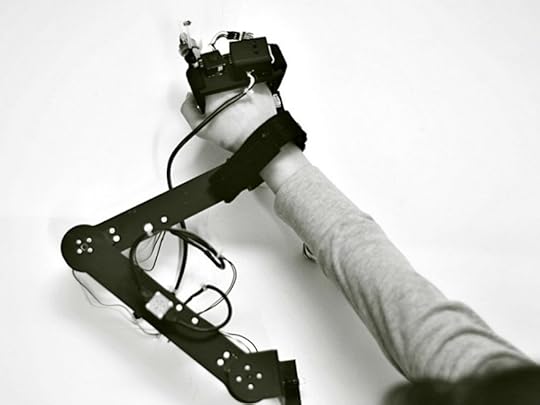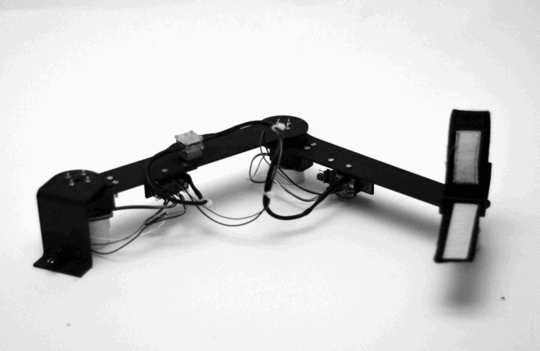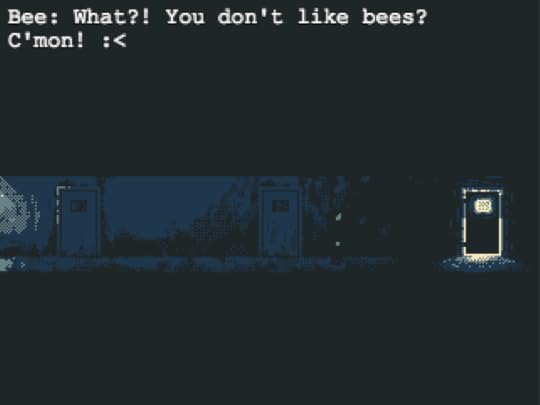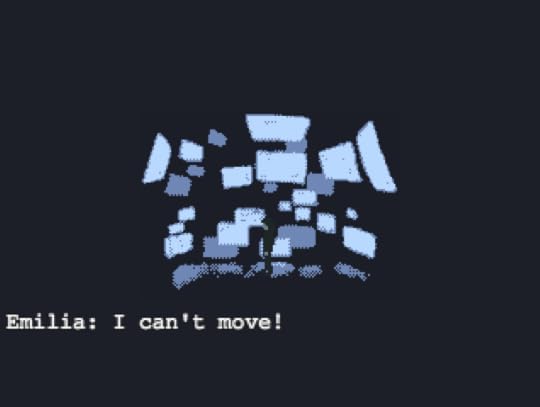Kill Screen Magazine's Blog, page 287
February 26, 2015
A new virtual reality game buries you alive in an actual coffin
Taphophobia, the fear of being buried alive, is described as being "irrational." It's not. An irrational fear is being scared of being shot into orbit while sleeping, or crocodiles crawling down your chimney—the likelihood of either happening is super slim. But you could be buried alive tonight or tomorrow, and with terrifying ease. A spiked drink, a couple of hours, and a spade is all that's needed.
how about you voluntarily get buried alive?
Also, those who would deem it an "irrational" fear should be careful where they're poking that word. Of the many people inflicted with taphophobia over the years, among them are influential greats such as Edgar Allen Poe, Chopin, and Hans Christian Anderson. Would you call them irrational for any other reason? I should hope not.
Let's say you are one of these people who goes out of their way to mock others for their fears, what can be done with you? Well, short of throwing a deadly snake at you, or locking you in a freezer, how about you voluntarily get buried alive? Seriously: that's the concept behind virtual reality game Taphobos.

It's played with two people. One of you hops into an actual coffin with a virtual reality headset hanging over your face. It's here that you proceed to get snug up to the elbow in the morbid wooden box, or carry out the entirely rational act of crapping yourself. The other person sits at a computer also with a headset, and awaits the instructions that will soon be murmured into their ears, travelling as a shaky voice from the occupied sarcophagus.
simulate dying inside a virtual coffin.
The idea is for the person inside the coffin to examine the underside of the casket's lid, upon which a map has been drawn in crayon. They then have the amount of time it takes for them to use their limited air supply to guide their partner at the computer to the coffin's position inside the virtual world. Do so, and you're saved from certain death, but not from becoming part of the taphophobic population. If you don't, then you get to simulate dying inside a virtual coffin. Taphobos's five-person creative team say that it allows you to experience "what it would be like if you were buried alive with just a phone call to the outside world."
The answer to the query that the game invites (what's it like being buried alive?) is probably revealed in the research project that it has since become part of at the University of Lincoln. It's called, rather directly, "Uncomfortable Gaming Experiences." Yep, that seems an appropriate way of putting it. Taphobos isn't restricted to studying, though, and has been shown in public at Game City 9, and will also make an appearance in London at Rezzed's Leftfield Collection between March 12th and March 14th.
Hunger is an eerie descent into lost innocence, and it looks great
Beware of creepy dead arms that want to give you hugs.
The right controller for three-dimensional spaces
The Dual Shock controller has only been refined, not improved.
Listening in on the Londoners who talk to their street signs
Mobstr's new street art encourages Londoners to talk to roundabouts and signposts.
The best ‘90s-era Bruce Willis movie is a baffling videogame you never played
Rage and sarcasm in Neversoft’s Apocalypse.
February 25, 2015
Crash Bandicoot and the end of videogame mascots
The PlayStation straddled the divide between cartoon and realism.
Laser tag is out, questing is in
A Swedish company is bringing "questing centers" to North American shores.
A grown-ass man replays Final Fantasy VII
The greatest game ever made, and the problem of memory.
February 24, 2015
The Forced Finger Project: Can A Machine Help You Sketch Like a Pro?
If the early days of your time at design school were anything like mine, you probably look back fondly (maybe a bit too rose-tintedly) on simpler days of 'getting back to basics' with hour after hour of practice drawing free-hand straight lines, ellipses, and cuboids in perspective (kids still do this these days, right?)—developing all the basic building blocks for the sketching skills you now wield so expertly.
the radical impact robotics could have on human life and culture
As AI, algorithms and robotics continue their seemingly inevitable march towards human usurpation, could this nobel tradition be next in line for a bit of technology rendered redundancy?
Saurabh Datta is a recent grad of Copenhagen’s Institute of Interaction Design, whose final year thesis work set out to explore the increasingly complex relationship between the agency of intelligent technological tools, and our own free will and human faculties.

Datta's first thought experiments and prototypes explored a perhaps not-too-distant future where learning to play the piano is dramatically changed, or made redundant, with the use of a strap-on device that physically manipulates the fingers into tuneful performance—later augmenting the experiment with a complementary contraption to move the wrist simultaneously.
Does robot-empowered repetition lead to real learning?
Part-intriguing, part-amusing (with only a pinch of disturbing), these experiments point to the radical impact robotics could have on human life and culture—what if a complete beginner could strap in their hands and perform a pre-programmed masterpiece? Could this be a new, faster way to learn or could it spell the end for hard-earned skills?
Datta soon shifts focus to experiment with the simulation of another hand-skill—sketching. Grabbing the drawer by the forearm, Datta's free-hand cheat-machine renders the desired shapes (rectangles or circles, for example) and corrects the movements of the drawers hands as they try to draw them. Similar to the pre-programmed piano masterpiece playing, this device presents the tantalizing possibility of sitting down, strapping in, and retracing the pencil strokes of a digitally recorded master draughtsman.
Although clearly rudimentary at this stage (apparently built in a week), Datta's contraptions are an interesting glimpse into our possible future robot-assisted lives. This little experiment raises some interesting questions around the future of learning and design practice. Does robot-empowered repetition lead to real learning? What does this mean for the un-robotically enhanced? What do we lose (a lot I would suggest) when we disconnect the training of our appendages from the application of the mind?

The AI in Fire Theft only wants to be your friend, and it's adorable
Fear of artificial intelligence seems to be on everyone's lips lately, especially since Elon Musk, Stephen Hawking, and Bill Gates publicly stated that it will be humanity’s certain doom (I’m paraphrasing).
Yet, while technological singularity remains one of sci-fi’s favorite villains, movies like Her and Spielberg’s A.I. show a different side to humanity’s marriage to the super computer. Yes, artificial intelligence might surpass us. But who’s to say they’ll want to hang around a bunch of lowlife meat bags such as ourselves for very long anyway? Who’s to say that artificial intelligence won’t gaze upon its creator and see what we see in them: something to fear.
Instead of finding cyber terrorists, you come across a benevolent gang of AI.
Fire Theft, a short point-and-click adventure from the curated Antholojam, explores a more sympathetic perspective toward AI in our near-future. As an NSA employee, you’re tasked with getting to the bottom of some unusual internet activity coming out of an abandoned industrial complex. Only, instead of finding cyber terrorists, you come across a benevolent gang of self-aware AI hiding in the shadows, trying to stay alive just like the rest of us.
You probably don’t often imagine AI—even the self-aware kind—as possessing much personality, but in Fire Theft each one shines with its own magnetic individuality. From a flighty, emoticon-savvy program named Bee, to the literature-learnéd AI who calls himself Foucault, getting to know each one feels like making a new best friend in an online forum. It’s a detached form of intimacy, but somehow more revealing than the friendships you might make IRL (in real life).

Like human beings, each AI bears the marks of its origins, even when they can’t remember much about their past. Foucault, for example, was programmed to learn language through a large body of our greatest literature. He’s a verbose and empathetic type, leading the others and making judgment calls for the group. Bee seems more akin to a search engine, spouting out interesting factoids and favoring more hive-minded information systems.
The stories they tell about coming into being and consciousness feel oddly relatable. Like my fellow generation of digital natives, the AI in Fire Theft figured out who they were by stumbling and stuttering across the interwebs as young’uns. Their identities are strong, yet malleable, adapting to new information and the opinions of others.
The merging of our online and offline identities is the biggest existential crisis of our near-future.
In fact, at times, your friendly gang of AI seem less like a super intelligent computer and more like a commentary on the nature of our online identities. If artificial intelligence is the biggest existential crisis of our far-future, then the merging of our online and offline identities is certainly the biggest of our near-future. In the past month alone, our online behavior and conduct has been the center of focus for everything from a Law & Order SVU episode to a This American Life podcast.
While we struggle to understand who we are in digital space, the gang in Fire Theft presents a plethora of identities formed purely through digital information. And let me tell you, the results are adorable. Each self-aware program is as curious and excitable as the last, always asking their human companion for a viewpoint so they can incorporate it into their own knowledge base.

It's an idealized version of what it means to grow up in—or, to actually inhabit—digital space during your formative times. Of course, malware still exists in Fire Theft's world, and in a terrifyingly self-aware form. But the positive aspects of online relationships conquer in the end. And we can only hope that the self-aware artificial intelligence of our actual futures proves to be half as charming.
So, we could indiscriminately fear humanity's impending marriage to artificial intelligence. Or, we could take a step back and get to know them a little bit more. Who knows, we might end up having more in common than you think.
You can play Fire Theft for free on any browser, along with the other sci-fi centric games featured in the Antholojam here. You can follow creators Micah Johnston and Matt Starsoneck on Twitter to see more of their work.
Kill Screen Magazine's Blog
- Kill Screen Magazine's profile
- 4 followers



